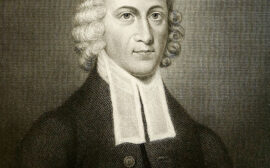By: Justin Angelos | January 24, 2022
The doctrine of the Trinity is one of the most beautiful doctrines of the Christian faith, the doctrine the Trinity gives us a picture of how relationships should function within the family unit. The Father, Son, and Holy Spirit, the husband, wife, and children. The plural nature of God reveals where and what love truly is. Dr. Nabeel Qureshi explains, “Love is eternal because love has existed for as long as God has existed which means love is objectively real; because love isn’t just something that God expresses, love is who God is because He is Triune.”[1] How is the Trinity a model for the family? The Doctrine of the Trinity is the best and most practical explanation for relationships. The Trinity is not three gods, the Trinity is one God who is singular in being and plural in person and each person is equal in essence to the other, “each possesses fully and simultaneously the identically same, eternal divine nature. Yet each is also an eternal and distinct personal expression of that one and undivided divine nature.”[2]
What distinguishes the Father from the Son, and the Son from the Holy Spirit? What distinguishes the three members of the Trinity are the way they relate to one another and the role that each has within the Trinity. The Father is the supreme authority among the persons of the Trinity, and the Father has planned that redemption would take place through the Son and that the Son would have the highest place of exaltation.
The Son (Jesus Christ) had the distinct role of becoming incarnate in order to take on our sins and provide His life as a substitute sacrifice for us.[3] (Phil. 2:6–8; 1 Peter 2:24; Eph. 1:9-10) The Holy Spirit’s role was to anoint and empower Jesus just as the prophets foretold. (Isaiah 11:2) This was so that the Son could do the work His Father sent Him to do and when the anointing work of the Son was completed, the Holy Spirit raised Jesus from the Dead. (John 5:19; Romans 8:11) The roles within the Trinity serve as a reflection of how families should function. The husband and Father have the highest authority in the home, under God and children are under the authority of the mother and father. The Apostle Paul gives instructions for husbands and wives. A husband is expected to love his wife in the same way Christ loved the Church and sacrificially gave himself. (Ephesians 5:20-27) God did not give husbands the authority for their own personal self-gratification to use to their own advantage. It is very important for children to see their mother and father living a godly life, and not just preaching a godly life. Children need to see their father loving their mother the way Christ loves the church. God has given fathers the responsibility of training their children in the way of the Lord. (Proverbs 22:6) In order for fathers to train their children, they themselves need to be doers of the word, abiding in Christ so this way it will reflect in the life of father’s and not just in their words. (John 15)
The Apostle Paul also explains what love should look like, “Love is patient and kind; love does not envy or boast; it is not arrogant or rude. It does not insist on its own way; it is not irritable or resentful; it does not rejoice at wrongdoing but rejoices with the truth. Love bears all things, believes all things, hopes all things, endures all things.” (1 Corinthians 13:4-7). Paul is showing that love (agape) does not look like the world’s idea of love, and that, love is not self-serving. It is serving the other person, being quick to forgive, and “enduring all things together.”
About the Author

Seattle native Justin Angelos brings a passion for evangelism and discipleship along with theology and apologetics. He has studied at Biola University and Liberty University. Justin focuses on providing help for those who suffer from emotional and anxiety issues.
Notes
[1] Nabeel Qureshi, Houston’s First Baptist Church, 2017.
[2] Bruce A. Ware, “The Father, the Son, and the Holy Spirit: The Trinity as Theological Foundation for Family Ministry,” in Trained in the Fear of God: Family Ministry in Theological, Historical, and Practical Perspective, Randy Stinson and Timothy Paul Jones, eds (Grand Rapids, MI: Kregel Academic, 2011), 63.
More From This Author
Justin Angelos, “What is the Difference Between Miracles and Magic?,” BellatorChristi.com (11/20/2021), https://bellatorchristi.com/2021/11/20/what-is-the-difference-between-miracles-and-magic/
Copyright, 2022. BellatorChristi.com.






Hello Barry Jones,
thank you for reading my article and sharing your thoughts. Would you be willing to explain why “my understanding of Jesus’ human nature is inconsistent with my understanding of the Trinity.?” The purpose of my article was not to give a comphrehensive explanation of the Trinity. My main purpose was to give an explanation of the “foundation” the family/home should be built on. If you noticed I cited Ephesians chapter 5 and 1 Corinthians 13 because “Family” was my focus not the Trinity. I have been thinking about writing an article on just the Trinity. Thank you again for your comments, I did enjoy reading what you wrote.
If even god cannot act without implicating his own nature, then Jesus was similarly limited. Indeed, there is no such thing as acting apart from one’s nature.
If Jesus had “two natures”, then he necessarily implicated both in everything he said or did.
Meaning, both of his natures were equally implicated in his cry of dereliction, that the Father had “forsaken” Jesus.
You will say the Father only forsook the human “nature” of Jesus, because the Father’s forsaking Jesus’ divine nature is not consistent with your understanding of the Trinity.
But Jesus is “person” who is indivisible. If he has two natures, that doesn’t open the door to splitting him up whenever theological expediency dictates. The Father did not forsakeJesus’ human nature, but forsook esus as an entire two-natured indivisible person.
Meaning the Father also forsook Jesus’ divine nature.
Regardless, if Jesus can, by physical breathing on them, infuse the disciples with the Holy Spirit, then the Holy Spirit is essential to Jesus’ physical humanity. That’s required by NT theology, no matter how rational it might be for skeptics to say that Jesus the human being breathed oxygen normally just like any other human. No, Jesus’ breath was the Holy Spirit, whether that is absurdly fantastic, contradictory, or otherwise.
Therefore, if you press the point that the Father only abandoned the physical or human nature of Jesus, you are also saying the Father forsook the Holy Spirit, for the Holy Spirit cannot be subtracted from Jesus without asphyxiating him.
And since Jesus cannot be wrong, his belief that the Father forsook him must be correct.
Since Jesus told the truth about his forsakenness while he was still alive, the forsaking was a completed action at the precise movement he said it…while he was still alive…and while the Holy Spirit was still part of that human nature you think the Father forsook.
The Nicaean version of Jesus’ nature and relationship to the Father is refuted by these observations.
The consequence of achieving that rebuttal is that the traditional understanding of the Trinity as three persons who are in eternally unbroken harmony, is also refuted.
For these reasons, It was God the Second person of the Trinity, who truthfully confessed to being forsaken by the Father, the First person of the Trinity.
So while God might be tripate still, the “unbroken harmony” part must be false by logical necessity, which means any surviving doctrine of the Trinity would have to a major change away from the traditional understanding that has existed for the last 2,000 years.